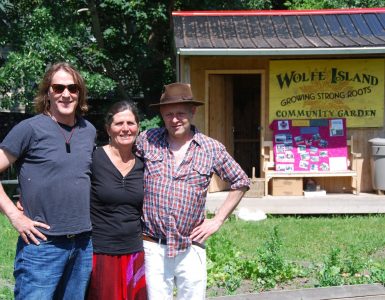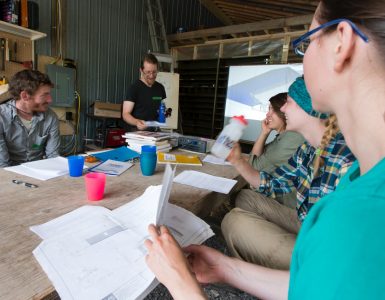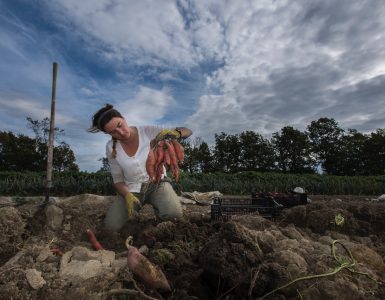This week I spoke with Mara Shaw, Executive Director of Loving Spoonful, about their newly tabled report on access to healthy food. The report focuses on food security: whether or not people have reliable access to nutritious food in sufficient quantity.
The report, authored by Janice Link and covering Kingston, Frontenac, and Lennox & Addington, is the result of something new: consultations with hundreds of community members, front line workers and community groups involved with food security.
“The truth is we’ve never done that kind of analysis in this community,” Executive Director Mara Shaw told me. “It’s a necessary step to be able to move forward.”
Some of the problems identified in the report were problems Shaw and others have long been aware of. For example, housing costs are so high that many people on fixed incomes are often forced to choose between food and adequate housing. Food bank and meal program demand continues to grow.
And yet, in Kingston, most who didn’t have enough food simply ate less, while nearly half borrowed money from banks or used payday loan services to buy food. Shaw told me that only about 25 per cent of people who needed more food used the food bank, largely because of the stigma involved.
Transportation is also a key barrier, especially for people in rural areas. As the report observed: “Several people pointed out that there is a free shuttle service to the Casino but nothing is available for people on a low or fixed income to buy groceries.”
In reading this report, it struck me that one of the biggest barriers to food security could be addressed without spending a dime: stigma. At least 20,000 people in Kingston live below the poverty line, and people below the poverty line can rarely count on access to healthy food. That’s not the result of some individual failing. That’s a major, systemic problem.
“People have to get over finding fault” with how low-income people spend their food dollars, Mara Shaw told me. “We do hear that there’s still a lot of judgment.”
The reality is that healthy food is expensive, and a calorie of healthy food costs about eighteen times as much as a cheap carbohydrate. If you have a low income, Shaw explained, “You can’t afford to buy a red pepper out of season for the same price as four boxes of Kraft Dinner.”
One of the report’s key recommendations is to build a good food centre in Kingston. (A similar community food centre has been operating in nearby Perth successfully for years.)
“Loving Spoonful is really interested in creating a centre where people can do work around food while building a movement,” Shaw explained. The site would include elements of a food bank as well as a kitchen for people to prepare food and learn cooking skills, gardens to produce food, and many other programs.
Shaw has had promising conversations with the City of Kingston about setting up a good food centre. “It’s mostly about finding a really good location. A place with a teaching kitchen that’s up to public health standards, with gardens out front, a storage space, a dining space where people can convene. And that it’s on a bus stop.”
Beyond that, big changes are required.
Mara Shaw told me: “I think the biggest thing that came out of the report is a renewed call for getting people the money they need to be able to buy their own food. Food insecurity wouldn’t exist in a community where people could afford to buy their own food.”
There is growing support for a Basic Income Guarantee (BIG): a minimum amount of money that everyone in Canada would get each year. Justin Trudeau’s mandate letters for the new cabinet called for a new national food policy and poverty reduction strategy. Shaw said: “If basic income isn’t a core part of that strategy I’ll be really surprised.”
“Food Banks Canada has just come out in support of BIG,” Shaw told me. “These are really exciting times.”
Aric McBay is a farmer and author.







